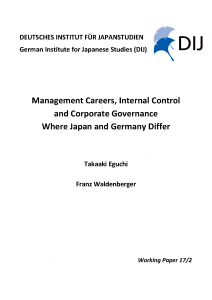
Download
Management Careers, Internal Control and Corporate Governance. Where Japan and Germany Differ
Details
2017, Tokyo, 27 p.Authors
Eguchi, Takaaki
Management Careers, Internal Control and Corporate Governance. Where Japan and Germany Differ

Career concerns of managers function as an important control mechanism in the context of corporate governance. They bear important motivating and disciplining effects. In Japan, where – in the absence of a well-functioning external market – management careers have been generally restricted to in-house promotions, career concerns also result in efforts by middle management to exert control over and influence top management decisions as they impact their career perspectives. Takaaki Eguchi’s paper explains the background and implications of such internal control mechanisms in Japan and points to their limitations in recent years given the increasing need for a stronger top management function. The paper concludes by emphasizing the role institutional investors can play in amending such limitations.
Reviewing relevant empirical research, Franz Waldenberger shows that managerial careers in Germany have long been embedded in an external market. However, market based incentive and control mechanisms remain less important than in the US. The reason can be seen in “internal control” mechanisms specific to German corporate governance. They stem from (a) relatively narrow career paths in terms of fields of expertise requiring a close collaboration among the top management team, (b) the representation of employee representatives on the supervisory board providing the capital side on the board with an additional information channel, and (c) the existence of a major shareholder in most listed companies allowing for direct communication and intervention by the capital side.
Keywords: Corporate governance, internal control, management careers